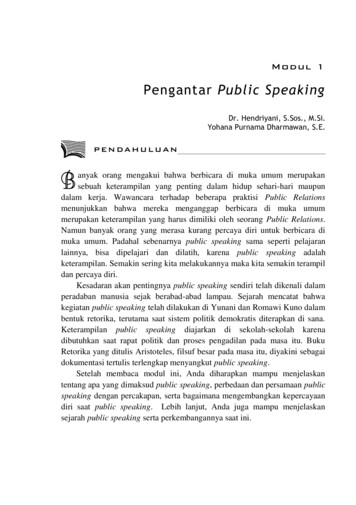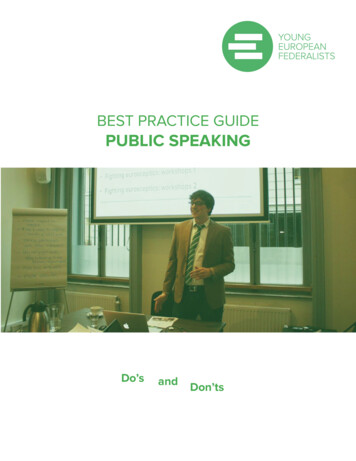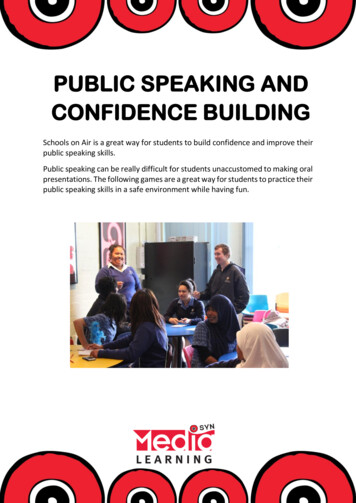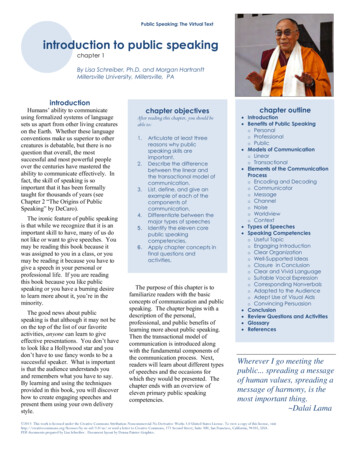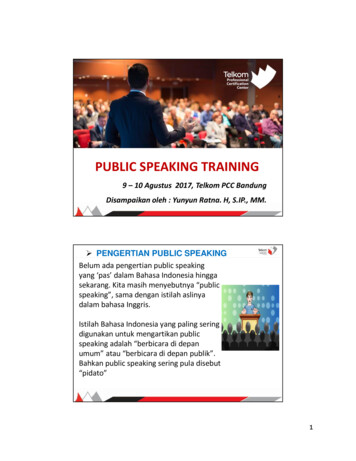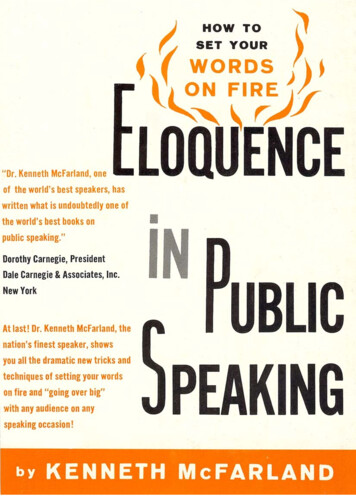
Transcription
Eloquence inPublic SpeakingHOW TO SETYOUR WORDS ON FIREKENNETH McFARLAND
1961, byPRENTICE-HALL, INC.Englewood Cliffs, N.J.ALL RIGHTS RESERVED. NO PART OF THIS BOOKMAY BE REPRODUCED IN ANY FORM, WITHOUTPERMISSION IN WRITING FROM THE PUBLISHER.Library of CongressCatalog Card Number: 61-10060published on CD with permission of James & Kay McFarland
TO MY FAMILY:Often alone while the author was gettingthe speaking experience that made thisbook possible.
PrefaceAcorny joke in my high school annual of 1924 has a teacherasking a student to define a vacuum. The Youth responds by saying,"Well, I've got it in my head but I can't tell it." In the confusion of ourmodem world one thing is becoming increasingly clear—you may aswell have a vacuum in your head if you can't tell what you do have inthere. If you can't tell it, you can't sell it.Almost all the positions and distinctions that are desirable in lifeseem to hinge more and more upon the individual's ability to successfullypersuade others. In an age of bigness and mass living, haltingconversation with one person at a time is too slow. Only those will berecognized who can stand up and speak out. The modern generation isbecoming increasingly intolerant of leaders who cannot literally point theway.This book is designed to help any person who earnestly wishes tospeak more effectively. It is not a text book. It is much more than thetraditional "speech book." It proceeds on the principle that one cannotspeak with sincerity and conviction unless he is a sincere person wholives by his convictions. It declares you cannot separate the speaker fromhis speech, that it is folly to expect things to come out of a person thatare not in him.In this volume you will find all the techniques and devices you needfor constructing and delivering a speech, but it frankly tells you these arenot enough. As important as these things are, they are still thescaffolding. In these pages you will perceive that the author is deeplyconcerned with helping you kindle that inward spark that sets fire to yourwords and burns them into the memory of your hearers. The book seeksto help you develop your own dynamic philosophy of living that is soessential to continued success in speaking.A little dictionary in my pocket defines "eloquent" with one word—"forcible." I believe an eloquent spokesMAN is an eloquent MAN whohas learned to tell others effectively about the things that make eloquentlives. This book will achieve its purpose if it helps you increase yourcapacity to live eloquently, and increases your ability to eloquently tellothers how to do it.
Table of ContentsI. UNPRECEDENTED OPPORTUNITIES DEMAND A NEWAPPROACH .1Dearth of good speakers. People have more facts and less understanding.Unnatural vacuum between need and supply of speakers. No lack of interest.Leaders who once "talked" must now "speak." Urgent need in business andindustry. Fundamental understandings not inherited. Our high degree oforganization can be great medium. Idea builders must keep pace with engineers.II. THOUGHT ON FIRE .17Bryan defines eloquence. Speaking a medium of service. No set pattern ofeloquence. Dramatic life not required. Don't practice your mistakes.Opportunities grow as capacity increases. Good speech serves by saving hearer'stime; transposing facts into philosophy; inspiring action; reaching peopleotherwise uninformed. Speech proficiency requires sacrifice. Nothing morerewarding than "putting light in people's faces."III. SPEAKER MUST BE INFORMED .32Broad information required to speak with understanding. No substitute forpreparation. Be sure "new" ideas not just new to you. One misstatement candiscredit entire discourse. How to increase your source of supply. How youngerspeaker may impress older listeners. Extemporaneous speaking distinguishedfrom impromptu; both require preparation. Prepared speakers must still think ontheir feet. Years of experience go into great speeches.IV. PREACH WHAT YOU PRACTICE .49Six questions aspiring speakers should ask themselves. Effective speechoutpouring of one's own convictions, ideals, experience, knowledge, faith.Hearers must recognize speaker as genuine person. Persuasive speech must, befrom heart to heart as well as mind to mind. Platform no place for phoney. Stillno substitute for knowing. Cannot separate what you say from what you are. TheFifty-Rose Man. Things you can do.
V. CONFIDENCE IN PUBLIC SPEAKING . .57Why do you lack confidence? Wholesome fear helpful. Confidence defined.You are greatest authority on yourself; stand on your own experience.Illustrations. You should have as much confidence as those who invited you tospeak. Experiences of "little people" important. Those who "could do it better"are not doing it. Illustrations. Confidence comes with knowing you know. Don'tapologize to audience because you are you. You are deliveryman with importantmessage. Over-emphasis necessary to push ideas across footlights. Speaking inofficial capacity adds confidence. Suggestions on appropriate dress for speakers.Be confident but not over-confident. Be confident you can improve.VI. SIMPLICITY IS POWER .78Most important things named with little words. Simplicity gets to the points. Bigideas in homely words. Grass roots people. "Let down your buckets where youare." Powerful simplicity illustrated.VII. HOW SPEECHES ARE DESIGNED .93Speeches classified as to purpose—to inform; to motivate action; to entertain.Speeches judged in terms of their objectives. No standard pattern for straightentertainment type. Examples. Action and Informative speeches fall in standardthree-part pattern: Introduction, Body, Conclusion. Responding to Introductions."Softening-up" exercises. Illustrations. The fast start. When to state objective.How to state. Illustrations. Identify with audience interest. How to build Body ofspeech. Topical outline plan recommended. Reasons. Conclusion should naildown and clinch objective. Types of Conclusions illustrated.VIII. THE CHANGE OF PACE .122An all-important device. Skillful speaker rests audience between flights oforatory. Technique described and illustrated.
IX. CONSTRUCTING THE SPEECH 126Tried and true plan. Idea folder for each speech theme. Three sides of speechtriangle—Speaker, Speech, Audience. Determine objective. Keep major pointsfew and make them good. Use topical outline. Make first draft yours; supplement with research later. Test your points and "sparklers" before delivery. Finaldraft should be written. Memorize speaking outline but not speech. Modelspeech embodying five basic principles. Working Outline and Speaking Outlineillustrated. Chapters VII, VIII, and IX summarized in seventeen steps forbuilding a speech.X. DELIVERING THE SPEECH .151Preview of chapter. Effective delivery defined. Speaking engagement starts priorto introduction. Should one eat before speaking? Responding to introduction.When several speakers on same program. Try to insure favorable speakingconditions. Blend remarks with "local color." Launching the speech. Projectyour voice. How to use microphone. Suggestions for improving speaking voice.Styles of speech. Set your own style. Gesturing; "suit the action to the word.""Attention getters." Speed of speech. Basic factors in holding audience: physicalmanner; eye-to-eye contact; audience barometers; keep theme constructive. Howto improve your word power.XI. TECHNIQUES FOR HOLDING AN AUDIENCE .188Continuation of section on speech delivery. Preview of chapter. Handlinginterruptions. Special techniques for unfriendly audiences. Capitalize ondistinguishing physical characteristics. How to handle "bloopers." Over-learnyour quotes. Use subconscious in memorizing. Conducting question-and-answerperiods. Using visual aids. Reading speech. Special techniques for radio andtelevision. Speech formula from mountaineer.XII. SPEAKING TO YOUTH GROUPS .209Chapter completes section on speech delivery. Youth audiences require specialtechnique. Seven basic principles. Sample approach to high school audienceincorporating recommended principles.
XIII. USING HUMOR .214Humor should be used to advance speech and clinch ideas. Early speakers waryof humor. No conflict between humor and sincerity. Test yourself before tellingstories. Humor not essential. Let humor come in if it wants to; do not drag it in.Humor must harmonize with both material and audience. Should always bekindly. Caution on jokes dealing with religion and race. Dialect stories risky.Don't fly off the nest if you lay an egg. Humor, like balance of speech, should beyours. Genius of story telling. When is story "proper"? You need be neither"low brow" nor "blue nose." Tests for appropriateness. Humor in selling. Summaryof Points to Ponder.XIV. THE INDISPENSABLE QUALITY .238Vitality is quality most desired in speech. More than enthusiasm. Speech titlesshould reflect vitality. Examples. Deal with things that make a difference.Devitalized "Speech for All Occasions." Examples of modern speaking andwriting with vitality: Charles H. Brower, Adlai Stevenson, Bryson Reinhardt, H.G. Wells, Don Herold, Charles T. Lipscomb. Examples of making points withpunch. Conclusion.
1Unprecedented OpportunitiesDemand a New ApproachNever have so many understood so little about so much.Sir Harry Lauder used to say the ability to hold an audience must bea gift, or else no Scotsman would possess it.A prominent public relations man, whose work requires him to be onthe receiving end of innumerable speeches, declares that if the ability tospeak is a gift, then "someone must have shot Santa Claus."We shall soon have 200 million people in the United States. Theeducational level of the general population is being constantly pushedupward. Virtually all of our people speak English. Yet the percentagewho can speak well enough to command an enthusiastic following isinfinitesimal. Experienced program chairmen, whose organizations canattract the best of the nation's speaking talent, lament that there arescarcely two dozen people in all the land who are "sure fire" speakers—after dinner, before dinner, during dinner, or any other time.This criticism is not offered as a blanket indictment of the currentand traditional avenues of speech instruction. There is, and there willalways be, a vital place for regular speech courses, debating anddeclaiming, presiding and toastmastering. However, it is becomingincreasingly obvious that our traditional instructional techniques need tobe supplemented.1
What accounts for our dearth of effective speakers? Is it becausethere is no longer a need for such ability?There are many chronic cracks about public speaking. One of themost threadbare of these is, "If all the public speakers in America werelaid end to end—both they and the audiences would be morecomfortable." Still, virtually every serious student of the modern sceneconcurs that there has never before been such a crying need for leaderswho have ideas, and who can effectively express those ideas. Thereasons for this obvious truth are rather easy to discern.The Country Is Wired for Sound But the SoundsAre Not ImprovingOur modern society has enormously increased the facilities fordispensing facts, information, and propaganda. The average citizen isbombarded with information on an ever-increasing scale. Newspapers,television, radio, books, and other media are shoveling out facts and datain a volume that defies comprehension, and the future promises anacceleration of this trend. The average citizen is literally drowning in asea of information. This, coupled with the fact that the educationalattainments of the people are being steadily increased, means the averagecitizen now possesses more facts than ever before. But, oddly enough,this same average citizen is currently more confused than ever. He frequently finds himself with complete sets of facts that completelycontradict one another. The possession of more and more informationalone has not given our people better judgment, more peace of mind,better balanced personalities, or firmer convictions as to the course ofaction they should pursue.It can almost be demonstrated that the better informed a person is themore likely he is to be confused. I know a man who drives a deliverytruck. He has been making the same rounds for a decade. He reads nonewspapers nor periodicals. He avoids all newscasts and "educational"programs. He has reduced life to its simplest terms and has almost noproblems that he recognizes. Of course, he is a "simple" person.Of those people who do have "informed" opinions on currentproblems, I find the ones are most secure who have but one source2
of information. They never clutter up their minds with the rest of theevidence. They are often wrong but never uncertain. The people whoreally need help these days are the sincere citizens who earnestly seek thefacts from all the sources available to them.Some observers declare that much of our modem day hysteria is theresult of people being constantly loaded up with information which theyare not prepared to process and handle. One frustrated soul recentlywrote his radio station an urgent plea to quit broadcasting tornado alerts.His letter said in part,We don't have any more tornadoes than we used to have, but now we hearabout them all the time. My grandpappy never worried about a tornado until hesaw it coming over the hill toward his house. He only saw two in 86 years andthey both missed him.I have decided I would rather take a chance on being in a tornado once in awhile than to worry about them all the time. Besides my house sets on a solidconcrete slab, and there is no place for me to get anyhow. I reckon if a tornadohits us dead center, I'll just end up on another slab. In the meantime, I say nuts tothe whole business —let's all relax!While the above viewpoint may not be worthy of emulation, it doesillustrate something of the frustration that may result when oneconstantly swallows more information than his system can digest. Theneed is for short cuts, for summarization processes, for pointing out whatthe facts mean in terms of intelligent action that the individual cansuccessfully pursue.The big need in our time is perspective. In the crush of modern livingthe average citizen may be likened unto an infantryman in the midst of agreat battle. He is right in the thick of it, yet he cannot see its broadoutlines, nor how it is shaping up generally. He has a lot of first-handinformation yet he often cannot even determine whether he is winning orlosing. He must have someone who can get up above the din of the battleto tell him how the day is going.Walter Lippmann said in an interview that Churchill and De Gaulleare the greatest leaders of this century because of their ability to"goalize" the needs of their day and to lead people to the solution ofproblems.3
A cartoon in The New Yorker depicts a housewife saying to herbellowing husband,"Why can't you lead a life of quiet desperation, like everybody else?"Another modern cartoon shows a store clerk explaining a weird"tinker toy" to a mother. "This toy," the clerk explains, "prepares thechild for modern living—no matter how you put it together it won'twork."The current scene is literally crying out for more media that helppeople develop a workable philosophy of living. We need more media fortransposing facts into a philosophy. We need improved methods oftranslating information into understanding. Many of the nation's fineeditorial pages make a great contribution in that direction, butunfortunately they are not widely enough read to meet the problem onanything like an adequate scale. Books and periodicals will always servesplendidly in their historic role of formulating sensible wholes out of amaze of data. Certain public interest features on television and radio arewonderful for cutting through mountains of minutia and emerging withclearly stated problems, or solidly supported conclusions. Still, perhapsthe greatest of all media for transposing facts into a living philosophy isthe medium of the public speech. Indeed, much of the radio andtelevision contributions to current problems are made by simplymultiplying the number who may hear a speech. Again, the newscolumns can do their best job of shaping public opinion on current issuesby reporting the words of those who have thought those problemsthrough, and have subsequently delivered public utterances concerningthem. Indeed the reporting of a speech is one of the few ways of gettingan opinion-shaping "editorial" on the front page. Thus, we have vastlyimproved the facilities for getting the thoughts of speakers to themultitudes and have placed their potential capabilities almost beyondlimit. But, strangely, we are making no corresponding progress inimproving the quality of the speech arts themselves.Here we have one of the mysteries of modern times. The need foreffective public speaking is the most intense of all time, and it is a needthat is destined to sharply increase as our society becomes morecomplex. The media for reaching larger and larger4
numbers of people is keeping pace with the increase in the need. We findourselves in the strange situation of having a good market, a growingdemand, and a fine distribution system—but no corresponding increasein the quality of the product.Following the Democratic National Convention of 1960, ColumnistGeorge Sokolsky wrote:"One thing about the Democratic Convention: oratory seems to be dead.Not one orator appeared on the rostrum. Not one speaker showered thespectators with wit, humor, pathos, flights of language, or flights of thought.There was no William Jennings Bryan; there was no Bourke Cockran. The silvertongues had become base metal . . .If the conventions are going to permit television to expose them, they willhave to adopt new devices. Oratory is a glorious art. It is designed to makewords act psychologically as music. The true orator must have language, voice,and gesture—a combination that eats into the mind and soul of the listener. . . the prompter machine . . . is a device of the devil . . .Did Demosthenes require a prompter machine to tell him what to do? Or didCicero? What weaklings machines have made us. We shall not only lose ourlegs, we shall have voices like chickadees." 1Most observers agreed the 1960 Republican Convention orators weremore talented than their Democratic counterparts, but Sokolsky'sappraisal reflects another facet of the existing shortage of speakingtalent.It has been said that "nature abhors a vacuum." If there is a demandfor a product or service, there will not long be a shortage. New operatorscome onto the scene, competition is created, and unnatural shortagessoon disappear. In fact, this is a basic tenant of our free enterprisesystem. But in the case of the demand for more and better publicspeakers nature's law seems to have been set aside. There is a vacuumand it is not being filled.Never Before Were So Many Interested in SpeechThe current dearth of effective speakers, then, has not beenoccasioned through lack of need for such service. Could the answer befound by concluding that there is simply not sufficient1The Topeka State Journal, Topeka, Kansas, July 19, 1960.5
interest among capable people who could supply the need? Here again,the trend is overwhelmingly in the opposite direction. There have neverbefore been so many intelligent and able people who were so deeplydesirous of increasing their effectiveness in the speech arts. The gamutranges all the way from dreamers and theorists to the most practicalminded politicians and hard headed leaders in business and industry.Every man with something to "sell" his fellow men—whether it be anidea, a service, or a product—is intensely interested in telling his storybetter.Let us note one bit of evidence in support of the above contention.The enrollees in the Dale Carnegie course now number some 100,000and the future promises steady growth. This writer has on severaloccasions addressed national conventions of the Dale Carnegie AlumniAssociation. From all over the nation came the faithful, paying their ownexpenses, and often using their vacation time to make the pilgrimage.Any outside observer could not fail to be impressed with the intelligenceof the group and the great power of their motivation. That motivation isan honest and abiding desire to improve their proficiency in the speecharts. Similar interest is being shown in other organizations designed toteach these things by correspondence, or in person.Are these people just simple souls who are floundering in a sea ofmisconceptions as to the importance of speech in our modern world? Noton your life! Over two thousand American industries have cooperatedwith the Dale Carnegie organization alone in an endeavor to improve thespeaking effectiveness of their executives and prospective executives.These industrial concerns include such names as Coca Cola and GeneralMotors. And who will say such training does not fill a need? Few of the100,000 now enrolled are there because of outside pressure. The pressurecomes from within these individuals. It is the pressure of a burningdesire these people have to improve themselves by improving theirproficiency in a field which they know is tremendously important.The "Revolt of the Inarticulate"For a variety of reasons "men of affairs" are becoming intenselyinterested in effective public speaking. Some of these reasons6
are as elemental as the law of self-preservation. One of America's leadingindustrialists had this to say in a private conversation,"I attended a national convention of educators at Atlantic City andheard a speech delivered by one of our prominent labor leaders. I wasboth envious and alarmed at how effectively he told his story. Thespokesmen for management who appeared on the same program werepitiful by comparison. I have rarely ever seen labor represented in animportant program by an individual who could not tell his story well. Weare going to have to develop the same skills in management or there isn'tgoing to be any management."Another champion of the American free enterprise system remarkedto the author that he had never seen the British Labor Party representedon an American platform by a poor speaker. This man had thehumiliating experience of following such a Laborite speaker on theplatform of an American university. In relating his experience later theindustrialist said,"It burned me up! That left-winger won the battle for his side with abean shooter, and I had an arsenal full of atomic weapons on my side—but I didn't know how to fire them!"I came home and went to work on this speaking business. I'll neveragain go to a meeting and read a paper prepared for me by the publicrelations department. From here on in, I am going to stand up on my hindlegs, look 'em in the eye, and tell 'em!"The Wall Street Journal2 reports a rapidly expanding new business ofghost writing speeches for business executives, with one public relationsman stating that he receives 1000 for each such speech he prepares.Newsweek3 made a round-up of the, growing number of corporations thatare not only training their own executives to speak better, but are alsoretraining professional speakers to put their story over to the public.Interest in Speech Comes from Both the Top andthe Bottom of the LadderIn every segment of our modern life more and more leaders arebecoming acutely aware that the causes they hold dear cannot surviveunless they develop people who can stand up on their hind23Wall Street Journal, January 4, 1960.Newsweek, November 23, 1959.7
Legs, "look 'em in the eye, and tell 'em." From the 4-H Clubs, throughthe university graduate schools, and out through the uttermost segmentsof the social order there is a new appreciation of the importance ofeffective communication. Constantly greater grows the demand for theindividual who can truly excel in effective speech. Such skillfullyconducted organizations as the American Institute of Banking are placingincreasing emphasis upon speech training as they prepare the futureexecutives of their businesses. Still the vacuum between supply anddemand persists.Another strange thing about the present situation is the keenappreciation of good speaking ability that exists among those who havemanaged to succeed without it. One rarely ever hears the significance ofeffective speech discounted by successful people who do not possess it.This fact seems to reverse an almost universal human tendency for the,individual to minimize the importance of attributes which he does nothimself possess. It is a notable exception to Shakespeare's statement,"We rarely like the virtues we have not." In a mid-western city auniversity professor annually conducts a speech course for topexecutives. Every student in these classes is an individual who nearlyany observer would agree has "arrived." Yet each week for three monthsthese men devote one of their valuable evenings to the all-importantbusiness of better speech and rarely does one miss a class. They come tothe sessions with their homework well prepared, and they are eager to geton with the learning. Some of them are equipping themselves to becomefull-time "missionaries" for private enterprise when their retirementreleases them from the burdens of routine administration. Others areequipping themselves to be "top top-executives," and still others are therebecause they have "just got to have more tools for getting through to theemployees, the customers, and the public."A well-known and eminently successful construction contractor onthe West Coast is gradually turning over his managerial responsibilitiesto his capable son. While this man has never even made an attempt atpublic speaking himself, he does not plan to release full responsibilitiesto his son until the younger man has become adept at expressing himselfin meetings. This successful and respected industrial leader states hisview this way,"I made it to the top despite the fact that I was virtually tongue8
tied. But this is a new day. My son could not get to the top with the samehandicap. In fact, I don't think he could even stay at the top if I startedhim there. I believe the time has come when a man has either got tospeak up, or move over."Another top executive enrolled in a short course in management at astate university. When asked what he considered his most acute shortage,he promptly answered, "Speech." Then he added,"Give me everything you can in public speaking, and let me leavehere set up to continue the study on my own. I've got a belly full of beingout-pointed in company meetings by people who don't know as much as Ido, but who can tell it better."Another enrollee in a special speech course for top executives said,"I'm here because of a speech I heard. The speaker said, 'There is alwaysroom at the top because so many people up there go to sleep and fall off.'He called this process 'rusting on your laurels.' There were 1800 men inthe audience and I was twenty rows back, but he hit me right between theeyes. I made up my mind then and there that I am not going to be thestumble bum of our outfit."Yes, there seem to be two sources of motivation behind the currentdrive for more proficient speech—it comes from those who can speakand from those who can't. But a single fact stands out in bold relief—thepresent dearth of top-flight public speakers has not been occasioned byany lack of interest on the part of the people.Leaders Who Once Talked to a FewMust Now Speak to ManyDown through the ages nations have kept their social, economic, andreligious life intact by the leaders of each generation teaching thesucceeding one in the most direct manner possible that is simply tellingthe new generation through day-to-day association. A great deal of ourtroubles in America in the past three decades comes in the fact that thissystem has broken down. The leaders who should be telling the story tothe new generation are no longer in daily and direct touch with thepeople.In industry, for example, there was a time when the "boss" was9
the foreman, the plant manager, the president of the company, thechairman of the board, and all the stockholders. He owned the place andhe ran it personally. He had five or ten employees. He knew their firstnames, their wives' first names, and their kids' first names. This meant"top management" was right next to the man on the line. They all rubbedshoulders every day. The employee got the economic facts of life"straight from the horse's mouth." He learned that the key word in theAmerican system is opportunity. Through his daily association with the"boss" he found out how people succeeded under the system—theyearned progress through individual proficiency. When "top management"was teaching these things daily and directly we were getting along awhole lot better than we are now.Today top management is no longer standing next to the man on theline. Instead of five or ten employees, the plant may now house five orten thousand. Top management is far removed from the daily life of theworker. The top executives are just as fine fellows as they ever were—but the man on the line does not know it like he once did. He can't knowit. He simply does not know the "big boss" and has no opportunity toobserve his personal qualities. But far more damaging is the fact that the"big boss" is no longer telling his story directly. Furthermore, the bigboss, who could talk very well to five or ten, usually does not possess thetechnique for addressing five or ten thousand. He is now issuingdirectives and bulletins, and writing an occasional article for the officialcompany publication. He is holding meetings of his assistants anddiscussing "personnel" problems. The man on the line whom the boss (ormaybe the boss's predecessor) c
This book is designed to help any person who earnestly wishes to speak more effectively. It is not a text book. It is much more than the traditional "speech book." It proceeds on the principle that one cannot speak with sincerity and conviction unless he is a sincere person who lives by
